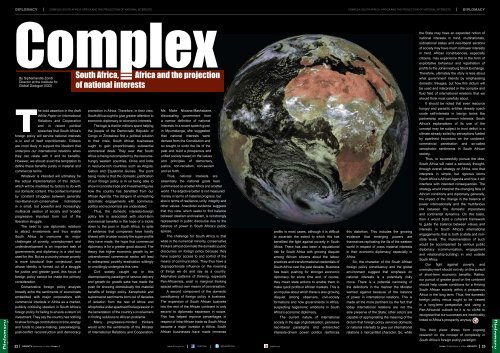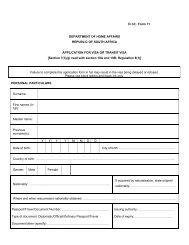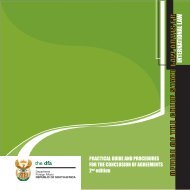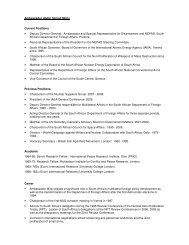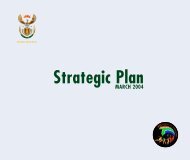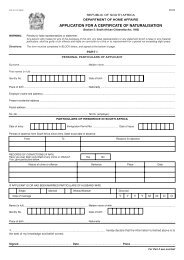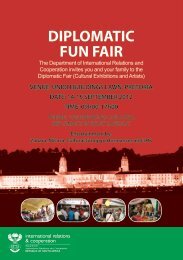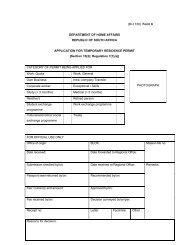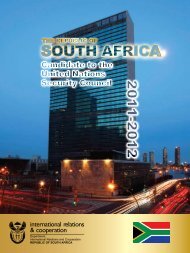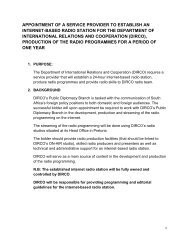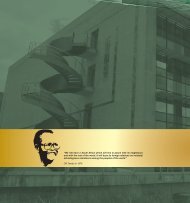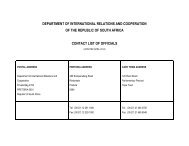UBUNTU Magazine Issue 1 - Department of International Relations ...
UBUNTU Magazine Issue 1 - Department of International Relations ...
UBUNTU Magazine Issue 1 - Department of International Relations ...
You also want an ePaper? Increase the reach of your titles
YUMPU automatically turns print PDFs into web optimized ePapers that Google loves.
DIPLOMACY<br />
COMPLEX SOUTH AFRICA, AFRICA AND THE PROJECTION OF NATIONAL INTERESTS<br />
COMPLEX SOUTH AFRICA, AFRICA AND THE PROJECTION OF NATIONAL INTERESTS<br />
DIPLOMACY<br />
Diplomacy<br />
Complex<br />
By Siphamandla Zondi South Africa,<br />
Director at the Institute for<br />
Global Dialogue (IGD)<br />
The bold assertion in the draft<br />
White Paper on <strong>International</strong><br />
<strong>Relations</strong> and Cooperation<br />
and in recent political<br />
speeches that South Africa’s<br />
foreign policy will service national interests<br />
is in and <strong>of</strong> itself unproblematic. Citizens<br />
are most likely to support the idealism that<br />
underpins our international relations when<br />
they can relate with it and its benefits.<br />
However, we should avoid the temptation to<br />
define these benefits purely in material and<br />
commercial terms.<br />
Whatever is intended will ultimately be<br />
the actual implementation <strong>of</strong> this dictum,<br />
which will be mediated by factors to do with<br />
our domestic context. This context is marked<br />
by constant struggles between generally<br />
neo-liberal-cum-conservative inclinations<br />
in a small, but powerful and increasingly<br />
multiracial section <strong>of</strong> society and broadly<br />
progressive impulses born out <strong>of</strong> the<br />
liberation struggle.<br />
The need to use diplomatic relations<br />
to attract investments and thus enable<br />
South Africa to overcome its major<br />
challenges <strong>of</strong> poverty, unemployment and<br />
underdevelopment is an important task <strong>of</strong><br />
governments and diplomacy is a vital tool<br />
used for this. But as a country whose poverty<br />
is more structural than conjectural, and<br />
whose identity is formed out <strong>of</strong> a struggle<br />
for justice and greater good, this focus <strong>of</strong><br />
foreign policy cannot be made the primary<br />
consideration.<br />
Conservative foreign policy analysts<br />
broadly echo the sentiments <strong>of</strong> economists<br />
embedded with major corporations with<br />
commercial interests in Africa as a market,<br />
publicly criticising idealism in South Africa’s<br />
foreign policy for failing to ensure a return on<br />
investment. They say the country has nothing<br />
to show for huge contributions in time, energy<br />
and funds to peace-making, peacekeeping,<br />
post-conflict reconstruction and democracy<br />
Africa and the projection<br />
<strong>of</strong> national interests<br />
promotion in Africa. Therefore, in their view,<br />
South Africa ought to give greater attention to<br />
economic diplomacy or economic interests.<br />
The logic is that for millions spent helping<br />
the people <strong>of</strong> the Democratic Republic <strong>of</strong><br />
Congo or Zimbabwe find a political solution<br />
to their crisis, South African businesses<br />
ought to gain proportionately substantial<br />
commercial deals. They aver that South<br />
Africa is being outcompeted by the resourcehungry<br />
western countries, China and India<br />
in resource-rich countries such as Angola,<br />
Gabon and Equatorial Guinea. The point<br />
being made is that the domestic justification<br />
<strong>of</strong> our foreign policy is in us being able to<br />
show in concrete trade and investment figures<br />
how the country has benefited from our<br />
African Agenda. The dangers <strong>of</strong> enmeshing<br />
diplomatic engagements with commerce,<br />
politics and economists are understated.<br />
Thus, the domestic interests-foreign<br />
policy link is associated with short-term<br />
commercial benefits in the hope <strong>of</strong> a trickle<br />
down to the poor in South Africa. In spite<br />
<strong>of</strong> evidence that companies have hardly<br />
shared with broader society the super-pr<strong>of</strong>its<br />
they have made, the hope that commercial<br />
diplomacy is for a greater good abound. The<br />
theory that higher economic growth by an<br />
untransformed commercial sector will lead<br />
to widespread poverty eradication wittingly<br />
or unwittingly undergirds this view.<br />
Civil society caught up in this<br />
disempowering paradigm <strong>of</strong> service delivery<br />
and growth for growth sake has made the<br />
push for showing domestically the material<br />
benefits <strong>of</strong> foreign policy. Xenophobic and<br />
supremacist sentiments born out <strong>of</strong> decades<br />
<strong>of</strong> isolation from the rest <strong>of</strong> Africa and<br />
Afrophobia under apartheid find expression in<br />
the lamentation <strong>of</strong> the country’s involvement<br />
in finding solutions to African problems.<br />
Many progressive-minded thinkers<br />
would echo the sentiments <strong>of</strong> the Minister<br />
<strong>of</strong> <strong>International</strong> <strong>Relations</strong> and Cooperation,<br />
Ms Maite Nkoana-Mashabane,<br />
dissociating government from<br />
a narrow definition <strong>of</strong> national<br />
interests. In a recent speech given<br />
in Mpumalanga, she suggested<br />
that national interests were<br />
derived from the Constitution and<br />
so sought to undo the ills <strong>of</strong> the<br />
past and build a prosperous and<br />
united society based on the values<br />
and principles <strong>of</strong> democracy,<br />
justice, non-racialism, non-sexism<br />
and so forth.<br />
Thus, national interests are<br />
essentially the national goals best<br />
summarised as a better Africa and a better<br />
world. The adjective better is not measured<br />
merely in terms <strong>of</strong> material progress, but<br />
also in terms <strong>of</strong> resilience, unity, integrity and<br />
other values. Anecdotal evidence suggests<br />
that this view, which seeks to find balance<br />
between idealism and realism, is not strongly<br />
represented in public discourse due to the<br />
balance <strong>of</strong> power in South Africa’s public<br />
spaces.<br />
The challenge for South Africa is that<br />
while in the numerical minority, conservative<br />
thinkers almost dominate the domestic public<br />
discourses on foreign policy because they<br />
have superior access to and control <strong>of</strong> the<br />
means <strong>of</strong> communication. They thus have a<br />
disproportionate influence on the meaning<br />
<strong>of</strong> things we do and say as a country.<br />
Alternative patterns <strong>of</strong> thinking, especially<br />
Pan-Africanists, exist in marginal thinking<br />
spaces without own means <strong>of</strong> conversation.<br />
A second component <strong>of</strong> the domestic<br />
constituency <strong>of</strong> foreign policy is business.<br />
The expansion <strong>of</strong> South African business<br />
into the rest <strong>of</strong> the African continent is only<br />
second to diplomatic expansion in scope.<br />
This has helped improve percentages in<br />
respect <strong>of</strong> intra-African trade as South Africa<br />
became a major investor in Africa. South<br />
African businesses have made immense<br />
pr<strong>of</strong>its in most cases, although it is difficult<br />
to ascertain the extent to which this has<br />
benefited the fight against poverty in South<br />
Africa. There has also been a reputational<br />
risk for South Africa with growing disquiet<br />
among African citizens about the labour<br />
practices and transformational credentials <strong>of</strong><br />
South Africa over the past decade. Business<br />
has been pushing for stronger economic<br />
diplomacy for some time and, <strong>of</strong> course,<br />
they mean state actions to enable them to<br />
make quick pr<strong>of</strong>its in African markets. This is<br />
an impulse about which there is also growing<br />
disquiet among observers, civil-society<br />
formations and now governments in Africa,<br />
suspecting hegemonic ambitions in South<br />
Africa’s economic diplomacy.<br />
The current nature <strong>of</strong> international<br />
society in the age <strong>of</strong> globalisation, pervasive<br />
neo-liberal paradigms and entrenched<br />
interests-driven power politics reinforces<br />
this distortion. This includes the growing<br />
evidence that emerging powers are<br />
themselves replicating the ills <strong>of</strong> the western<br />
world in respect <strong>of</strong> crass material interests<br />
in their economic diplomacy, especially in<br />
Africa.<br />
So, the character <strong>of</strong> the South African<br />
foreign policy constituency and the global<br />
environment suggest that emphasis on<br />
national interests is a potentially risky<br />
move. There is a potential narrowing <strong>of</strong><br />
the definitions in the manner the Minister<br />
warned against because <strong>of</strong> the balance<br />
<strong>of</strong> power in international relations. This is<br />
made all the more pertinent by the fact that<br />
today international relations are not the<br />
sole preserve <strong>of</strong> the State; other actors are<br />
capable <strong>of</strong> appropriating the meaning <strong>of</strong> the<br />
dictum that foreign policy services domestic<br />
or national interests to give our international<br />
relations a mercantilist character. So, while<br />
the State may have an expanded notion <strong>of</strong><br />
national interests in mind, multinationals,<br />
subnational states and neo-liberal sections<br />
<strong>of</strong> society may have much narrower interests<br />
in mind. African constituencies, especially<br />
citizens, may experience this in the form <strong>of</strong><br />
exploitative behaviour and repatriation <strong>of</strong><br />
pr<strong>of</strong>its to the Johannesburg Stock Exchange.<br />
Therefore, ultimately the story is less about<br />
what government intends by emphasising<br />
domestic linkages, but how this dictum will<br />
be used and interpreted in the complex and<br />
fluid field <strong>of</strong> international relations that we<br />
should think most carefully about.<br />
It should be noted that even resource<br />
hungry and parasitic entities already coach<br />
crude self-interests in benign terms like<br />
partnership and common interests. South<br />
Africa’s explanations <strong>of</strong> its use <strong>of</strong> the<br />
concept may be subject to trust deficit in a<br />
climate already soiled by perceptions fuelled<br />
by apartheid incursions on the continent,<br />
commercial penetration and so-called<br />
xenophobic sentiments in South African<br />
society.<br />
Thus, to successfully pursue the idea,<br />
South Africa will need a seriously thoughtthrough<br />
overall strategy on Africa, one that<br />
interprets in simple, but rigorous terms<br />
South Africa’s African Agenda and how it will<br />
interface with intended consequences. The<br />
strategy would interpret the changing face <strong>of</strong><br />
African conditions and diplomacy generally,<br />
the impact <strong>of</strong> the change in the balance <strong>of</strong><br />
power internationally and the multifarious<br />
link between the domestic imperatives<br />
and continental dynamics. On this basis,<br />
then it would build a coherent framework<br />
to guide the balance between values and<br />
interests in South Africa’s international<br />
engagements, that is, both at state and nonstate<br />
levels. The implementation <strong>of</strong> such<br />
would be accompanied by serious public<br />
diplomacy (communication, engagement<br />
and relationship-building) in and outside<br />
South Africa.<br />
Our fight against poverty and<br />
unemployment should not rely on the pursuit<br />
<strong>of</strong> short-term economic benefits. Rather,<br />
our pursuit <strong>of</strong> greater good on the continent<br />
should help create conditions for a thriving<br />
South African society within a prosperous<br />
Africa in the long term. Thus, the domestic<br />
foreign policy nexus ought to be viewed<br />
in a long-term perspective and using a<br />
Pan-Africanist outlook for it is no cliché to<br />
recognise that our successes are inextricably<br />
linked to Africa’s prosperity anyway.<br />
This think piece draws from ongoing<br />
research on the concept <strong>of</strong> complexity in<br />
South Africa’s foreign policy paradigm.<br />
22 <strong>UBUNTU</strong> diplomacy in action <strong>Issue</strong> 1<br />
www.dirco.gov.za DIRCOza<br />
@theDIRCOza thedircoza<br />
<strong>Issue</strong> 1 diplomacy in action <strong>UBUNTU</strong><br />
23<br />
Diplomacy


